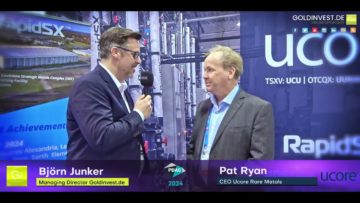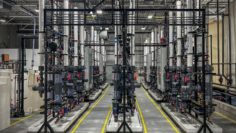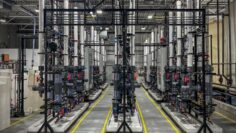High starting cadence and low error rate
Rocket Lab’s (NASDAQ: RKLB, WKN: A3CY7P) corporate strategy is as simple as it is ambitious, as the company strives to become a leading end-to-end space company. The aim is not only to develop and provide individual modules of the space business, but to cover all components of the value chain, from the launch of rockets to data management from space.
If you want to be active in space, you first have to overcome gravity and get there in the first place. This is why the development of rockets and launch systems formed the basis of Rocket Lab’s business. Today, the company not only has its own rockets and spaceports but has also expanded them to such an extent that several orders can be processed simultaneously and any delays in one project can be easily absorbed without affecting other projects.
However, getting into space is only the first step. Once there, Rocket Lab also wants to benefit from all the steps that are taken here. This is why the company has expanded its own product range to include satellites and their technology. Rocket Lab develops the satellites and their software, tests them extensively and then launches them safely into space using its own rockets.
What is still missing is the final step, because so far, the company has primarily acted as a contractor for other companies, enabling them to operate in space and earn money. In the future, Rocket Lab wants to offer data services from space itself. They have already become an important element of our modern world, and their importance will continue to grow in the coming years. And as their importance grows, so will their value.
That’s why Rocket Lab has set itself the goal of not only earning money from transportation into space, but also wanting to earn good money with its own services in space. While the first two steps have already been taken and Rocket Lab is now an established rocket supplier and satellite manufacturer and operator, the data service from space is a vision that will be realized in the coming years.
Focusing on the niche pays off
When everyone is fighting over the cake, it can be very easy to live off the crumbs. Although the big prestigious contracts bring a lot of attention, fame and honor and, if successful, a lot of money, the competition is usually also very fierce. This general truth also applies to aerospace technology. After its foundation in 2006, Rocket Lab, under Peter Beck’s leadership, initially concentrated on launching smaller rockets with a payload of up to 300 kilograms.
These rockets are usually launched into low earth orbit. The orders usually come from smaller companies. A characteristic feature of these rocket launches is that they are being carried out more and more frequently. This results in cost advantages, which in turn lead to a higher launch frequency. At the same time, work is being done to reuse parts of the rocket. Although something of a mass market is emerging here, Space X under Elon Musk has set its sights on leading the way in the colonization of Mars. Space X therefore mainly produces rockets with a payload of over 300 kilograms and also designs its rockets so that they can travel further distances.
This created a niche below 300 kilograms and in low-Earth orbit that Space X had not worked on and which Rocket Lab was able to successfully occupy. Rocket Lab developed its Electron rocket for this segment. It provides operators of small satellites with cost-effective and frequent access to space, with the company handling the entire launch process as an end-to-end service provider, from planning the mission and integrating the payload through to the actual launch and operation in orbit.
High starting cadence and low error rate
Since its maiden flight in 2017, the Electron has carried out 37 launches to date, launching 164 satellites into space. Only three launches have failed, which means a high success rate of 91.89%. The two-stage rocket, which is equipped with engines from Rutherford, is characterized by its low costs and rapid launch capability. Over the years, the company has succeeded in building up a solid customer base and winning them over with customized solutions.
This success story is now to be continued with the Neutron, a medium-heavy launch vehicle with a payload of 13 tons. The Neutron is also designed for flights into low Earth orbit and is intended to be fully reusable. This is because the design is such that the rocket consists of Rocket Lab’s own carbon fiber composite structure. The rocket will be launched from the new Neutron Production Complex on Virginia’s Eastern Shore. The spent rocket will return to this pad after a successful mission so that it can be returned to the production process for refurbishment and re-flight.
The ability to launch quickly is becoming increasingly important in space travel. With its launches in New Zealand, Rocket Lab has demonstrated this expertise time and again, attracting the attention of the US Department of Defense, which is interested in the possibility of launching new satellites into space at short notice, especially in times of crisis and conflict. The Ministry has therefore concluded a contract with Rocket Lab worth 50 million US dollars. Its aim is to demonstrate the ability to react and maneuver immediately in the event of a real-time threat.
Although this contract is not a guarantee of survival, it does stabilize Rocket Lab financially and it also indicates that the company is in an excellent technical position, as solutions designed for crises and conflicts must meet the highest technical standards, otherwise they can easily end in disaster. Rocket Lab therefore has the opportunity to become one of the long-term successful players in the field of space technology alongside Space X.
Goldinvest will therefore continue to follow the development of this interesting rocket investment and interested investors should do the same, as industry experts estimate that Rocket Lab is now where Space X was around six to eight years ago.
Disclaimer: GOLDINVEST Consulting GmbH publishes comments, analyses and news on https://goldinvest.de. These contents are exclusively for the information of the readers and do not represent a call to action, neither explicitly nor implicitly they are to be understood as an assurance of possible price developments. Furthermore, they are in no way a substitute for individual expert investment advice and do not constitute an offer to sell the discussed stock(s) or a solicitation to buy or sell securities. It is expressly not a financial analysis, but a promotional/journalistic text. Readers who make investment decisions or execute transactions on the basis of the information provided here do so exclusively at their own risk. There is no contractual relationship between GOLDINVEST Consulting GmbH and its readers or the users of its offers, because our information refers only to the company, but not to the investment decision of the reader.
The acquisition of securities is associated with high risks, which can lead to a total loss of the invested capital. The information published by GOLDINVEST Consulting GmbH and its authors is based on careful research. Nevertheless, any liability for financial losses or the content guarantee for topicality, correctness, adequacy and completeness of the articles offered here is expressly excluded. Please also note our terms of use.
Pursuant to §34b WpHG and §48f Abs. 5 BörseG (Austria) we point out that GOLDINVEST Consulting GmbH and/or partners, principals or employees of GOLDINVEST Consulting GmbH hold shares in Ucore Rare Metals and therefore a conflict of interest exists. GOLDINVEST Consulting GmbH also reserves the right to buy or sell shares of the company at any time. In addition, GOLDINVEST Consulting GmbH is remunerated by Ucore Rare Metals for reporting on the company. This is another clear conflict of interest.


















